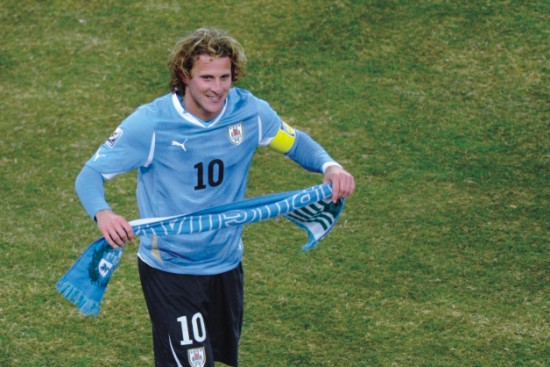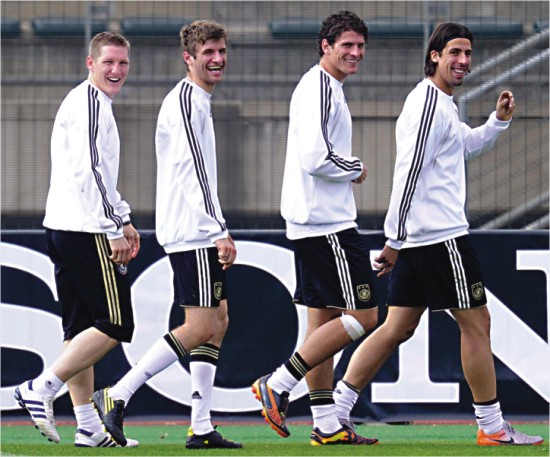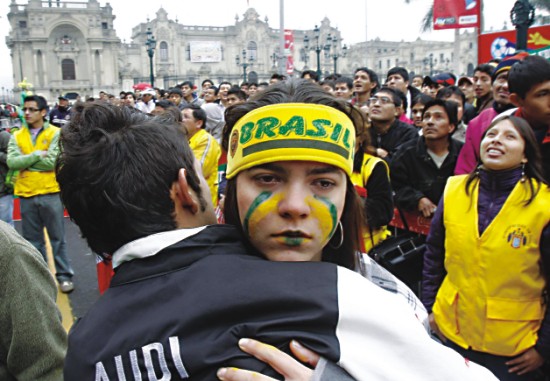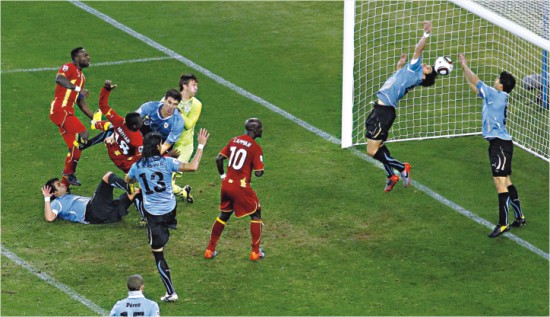
Inside
|
World Cup Memories REHMAN SOBHAN reflects on 60 years of the planet's greatest contest
Spending late nights watching the World Cup being played out in South Africa has contributed to my sleep deprivation. Now that the tournament is over with Brazil and Argentina both out of the running we can sleep longer and be exposed to less tension. Neither Spain nor the Netherlands appear to tax our passions with quite the same intensity. Fortunately, late night watching of football is hardly a novel experience for me though in most cases past competitions yielded more satisfactory outcomes than the present World Cup. I have been following the fortunes of the World Cup for the last 60 years. My first exposure to the cup dates back to the renewal of the competition in the post-World War-II period, in 1950, in Brazil. I was then 15 years old and in my final year, in the Senior Cambridge class in St. Paul's School, Darjeeling. There was no TV in those days to watch matches live. The only way to keep abreast was to follow match commentaries on the radio. Following the commentary from distant Brazil, sitting on a hilltop in Darjeeling, was itself a rare possibility. I therefore mostly had to read from the newspapers in our school library that England, one of
the favourites for the cup, had been eliminated in the first round of the competition by the unfancied United States, through a solitary goal scored by an unheard footballer by the name of Gaetjeans. This name still remains in my mind after 60 years -- it was only later that I read that he was a naturalised American of Haitian origin - due to the great joy it gave me to read of England's defeat. In those days my feelings of anti-imperialism were confined to a passion to see England defeated in every sporting competition they entered! Beyond this memory, I faintly recollect hearing the radio commentary of Brazil, the overwhelming favourites, being defeated by Uruguay, before a home audience of 100,000 fans in the Maracana stadium in Rio de Janeiro. Their defeat owed to the shooting skills of a blond Uruguayan named Schiaffino, their centre forward, who was the leading goal scorer of the tournament. Brazil's defeat occasioned national mourning in that country and quite a few suicides. By a strange coincidence the Uruguayan team which reached the semi-finals of the just concluded World Cup, thanks to the missed penalty by Gyan of Ghana, has another blond, Diego Forlan leading their attack, curiously enough he was also one of the leading goal scorers of the tournament. My interest in the World Cup was ignited by my ongoing interest in football both as a player and sports fans. My football playing days did not extend beyond St. Paul's but my interest in the sport has lasted through my life. As far back as 1948, I remember listening to live radio commentary in the study of the school headmaster, of the English FA cup final where Manchester United defeated Wolverhamptan Wanders, 4-2. I have since then remained a life long fan of Manchester United. In school we also followed the Calcutta football league with some interest, where I rooted for Mohammeden Sporting against my classmates backing East Bengal and Mohan Bagan. I could renew my enthusiasm for watching football when I arrived in England in March 1953. Within 24 hours of my arrival in London I found myself, courtesy of a fellow lodger in my boarding house in Hamstead, attending a 1st Division football match at Stamford Bridge, the home ground of Chelsea which was then a mid-level 1st Division team. I recollect I was not much impressed by the quality of their football. In my first few months in London, I once traveled one and a half hours by bus from North West to South East London just to watch Manchester United play Charlton Athletic. I even managed to see an international football match between England and Scotland at the old Wembley Stadium by investing one pound for a black market ticket costing 5 shillings. I still recollect the dribbling skills of Stanley Mathews on the right wing and Tom Finney on the left wing. Until Johan Cruyff and his all conquering Ajax football club, in the Netherlands, introduced the football world to total football at the beginning of the 1970s, football was played in a 2-3-5 formation with 5 forwards, three midfielders known as half backs, and two defenders known as full back, playing in fixed positions. My sense of adventure in getting to distant football grounds did not extend beyond my first six months in England so that the only other live match witnessed by me was after 15 years, in 1968. At that time I was a visiting scholar in England and was privileged to watch Manchester United win England's first European League cup defeating Benfica of Portugal. Their triumph owed greatly to the skills of the long-haired playboy, George Best, and the goal scoring brilliance of Denis Law and Bobby Charlton. The Benfica team was led by their outstanding forward, Eusebio whose thunderous shots at goal were no less powerful and perhaps more accurate then those of Tevez today or even his countryman, Cristiano Ronaldo.
My declining enthusiasm for travelling any distance to see live football owed, in no small measure, to the spread of television to the football field, which enabled me to see live matches on the screen. In those early days images were in black and white and quite grainy, with no provision for action replays. This somewhat moderated the pleasure I experienced in watching the magical skills of the Hungarian football team, led by the sublime Ferenc Puskas. I remember seeing this team administer a 6-3 thrashing to England, their first such defeat on home soil. I possibly aroused the ire of the English members of my college in Cambridge, sitting around the TV in our common room, by my loud exclamations of joy at each Hungarian goal. The goal scoring skills of their deep lying centre forward, Hideguti and the passing skills of the inside forward Kocsis, backed up Puskas introduced the British to a level of football which they had never seen before. The Hungarians were expected to win the 1954 World Cup held in Switzerland. However they were, quite surprisingly, beaten by West Germany, led by Fritz Walter. Germany were then an unfancied team and hardly comparable to their victorious team in 1974 led by Franz Beckenbaur or even the highly proficient young team which demolished Argentina in the recent World Cup. Hungary's extraordinary defeat owed, in some measure, to the injury of Puskas in a preceding match when they defeated Brazil, in what was an exceptionally violent encounter which was then termed the Battle of Berne. The Hungarian team, which ruled world football in the mid-50s, disintegrated after the Hungarian uprising of 1956 against Soviet domination. After the suppression of the uprising by Soviet tanks, Puskas and a number of Hungary's leading players fled abroad. Puskas ended up in Spain where he joined up with an Argentinian émigré, Alfredo di Stefano, who many compare to Pelé and Maradona, to become the backbone of the Real Madrid football team which dominated European football for nearly a decade in the 1950s and early 60s. I remember seeing a full recording, on video, of Real Madrid's 7-3 annihilation of Eintracht Frankfurt in the European Cup Final of 1960 held at Hampden Park, Glasgow where the skills of di Stefano were amply demonstrated.
I did not see anything of the World Cup victories of Brazil in 1958 in Stockholm when the 17-year-old Pelé made his historic debut for Brazil or in the 1962 competition in Chile where Garrincha, known as "Little Bird' carried Brazil to victory in the absence of an injured Pelé. Sitting in Dhaka in those days, before PTV arrived on the scene, there was no way we could see these matches and had to be content with newspaper reports. Only in later years, could we capture glimpses of these triumphs of Brazilian football on video recordings. The first World Cup I saw, in quality footage, was the competition in Britain in 1966, which was won by England defeating West Germany, 4-2, in the final at Wembly. I saw the film of this competition when I arrived in London towards the end of 1966 and in later years, videos of some individual games such as the final. I cannot say that I was particularly impressed with the skills of the English football team. Geoff Hurst, the West Ham striker, who scored a hat trick in the final was hardly a top class player, nor were other members of the team, except for Bobby Charlton and their world class goal-keeper, Gordon Banks. I thought England were lucky to defeat the Portuguese team in the semi-final, with Eusebio, who was the star of the tournament, in top form. I did not again get to see the historic triumphs of Brazil in the 1970 World Cup in Mexico. Even though PTV was in business I do not remember their showing us any of the matches. We were then heavily engaged in the build up to the historic 1970 elections so that, even for me, football had to take a back seat. This was unfortunate since the 1970 team, with Pelé in top form, was reputed to be its best ever team. The 1974 World Cup gave me my only opportunity to see a live World Cup match. I was, fortunately, visiting West Germany as the guest of their government, and made it a precondition of my visit that they should ensure that I could see at least one live match. As a result, my hosts managed to get me a ticket to a match in Frankfurt between Poland and Yugoslavia. This was hardly the match of my dreams though Poland was then a highly skilled team and eventually reached the semi-finals. I could, however, get to see live, on a large screen, the epic final of the 1974 cup, between Netherlands led by Cruyff and West Germany, led by Franz Beckenbauer. Both these teams were the best ever fielded by their respective countries. The brilliance of the total football practiced by Cruyff and his colleagues was blunted by the less skilled but more persevering skills of Beckenbauer and his colleagues, many of whom, such as Gerd Mueller, the leading goal scorer of the 1974 World Cup, became household names in Germany. Now yet another Mueller has appeared, as a young man with a promise, to emulate the goal scoring feats of his famous namesake. It was not till 1978, when I was a visiting scholar in Oxford, that I could witness more or less all the matches in the World Cup, then being played in Argentina. I remember sitting with my sons, watching every match of that series on colour television. The Argentinian team which won the cup, had some exceptionally good forwards such as the bandit-looking Luque and the long-haired Mario Kempes, backed by the exceptionally brilliant mid-field play of Ardiles and the defensive skills of their captain, Pasarella. In the final, Argentina defeated Netherlands who retained much of their superb team of 1974 but were without their lynchpin, Cruyff. In one of the great tragedies of world football, Cruyff, who was still in his prime, retired from international football so that he did not have to play in Argentina since it was then ruled by a particularly bloodthirsty military dictatorship. I do not know of any other world famous footballer who could take such a principled position. Cruyff continued playing football for some years but this was not for his country but for Barcelona, who he led to victory both in the national league and the European Cup. In the wake of the World Cup, Ardiles along with Villa, who was a forward in the victorious 1978 Argentinian team, moved to London to play for Totenham Hotspur, and led them to the top of the 1st Division. Ardiles proved to be the forerunner of a growing surge of immigrant footballers from Europe, Latin America and Africa who have greatly enhanced the quality of British football while impoverishing the quality of the English national team. Back in Dhaka, BTV managed to get its act together so that we could now sit in our living rooms and watch, live, most of the World Cups of the 1980s and 90s and eventually in 2002 and 2006. In 1982, the favoured teams in the World Cup were France and Brazil. However, Brazil were unexpectedly defeated by Italy in the second round and France by West Germany in the semi-finals. Many reckon that the French defeat was hastened by the assault of the brutish German goalkeeper who broke the neck of the French forward, Patrick Battiston, in a tackle which should have sent him to jail for committing a violent crime but did not even cost Germany a penalty or earn him a red card! Much to everyone's satisfaction, Germany were defeated by Italy in the final with Rossi scoring to become the tournament's top scorer. The 1986 cup, won by Argentina was of an exceptionally high standard, though some of the best teams, Brazil and France, did not reach the final. The Brazilian team was not up to the standard of the 1982 team but still retained some exceptional players such as Zico, Falcao, their captain Socrates. The French team, led by Michel Platini, possibly the best forward to have represented his country, had won the European Cup in 1984. Both Brazil and France had also peaked a few years earlier, but both teams remained of the highest class. In, perhaps the best game of football I have ever witnessed, France defeated Brazil, when in the dying moments of the game, Zico, who had never before missed a penalty misfired a penalty which would have equalised the score. Gyan of Ghana is not the only player to have lost his team a place in the semi-final. France, in turn were defeated by West Germany in the semi-finals. The 1986 World Cup eventually turned into a personal triumph for Maradona, at his sublime best. People still remember his famous Hand of God goal against England, where he scored a goal with his hand. By way of atonement Maradona went on to score perhaps the most memorable goal in World Cup history, when he gathered the ball in midfield and then wove his way past half the English football team to score an unimaginable goal. Germany was once again defeated in the final, with Maradona leading his team to a richly applauded victory since few people had forgiven the Germans for the violence inflicted on Battiston in 1982.
The 1990 Word Cup was perhaps one of the poorest in terms of performance and was eventually won by West Germany, who made their third successive appearance in the final. They defeated a much-depleted Argentina team, still led by Maradona, whose individual skills, could not, this time compensate for the limitations of his team. By then Maradona had moved to Italy and through his exceptional skills had taken Napoli to a number of Serie A and Cup triumphs. He was a global celebrity and his high living life stage had begun to catch up on him. His descent into drugs had however not yet caught up with him. But in the 1994 World Cup, won by Brazil, an overweight and much slower Maradona was expelled from the tournament, on account of drug use. It was a tragic end to an outstanding career which was only matched by the famous head butt of the Italian player, Mattarazi, by the incomparable Zinedine Zidane, of France, in the final of the 2006 World Cup which marked the end of a no less distinguished career. Zidane had been the prime mover of France's victory in the World Cup of 1998, when he was bakced by a galaxy of stars such as Desailly, Thiery Henry, and Patrick Viera. France could match this performance in the World Cup of 2002 held in Japan and Korea which was again won by Brazil, due to the goal scoring skills of Ronaldo and the ball skills of his partner, Rivaldo. In this tournament, in my view Ronaldo was past his peak and was no longer the skilled ball player he was in the mid- 1990s when he was chosen the World player of the year. He put up a poor show in the 1998 World Cup and though he retained his goal scoring skills in his years with Real Madrid and in subsequent World Cups, I felt there was something missing in his play which lacked the subtlety of Zidane's skills. Perhaps, after his injuries incurred in his days with Inter-Milan in 1990s, he emerged a lesser player than he used to be. Rehman Sobhan is Chairman, Centre of Policy Dialogue and the Chairman of Forum's Editorial Board.
|




